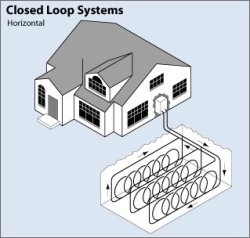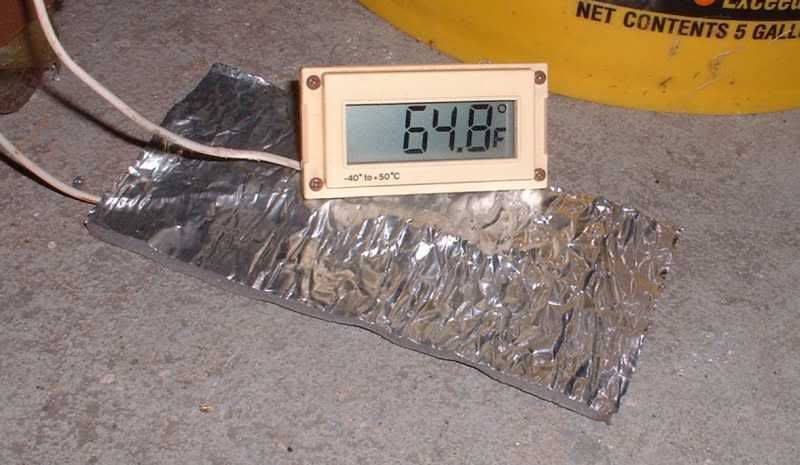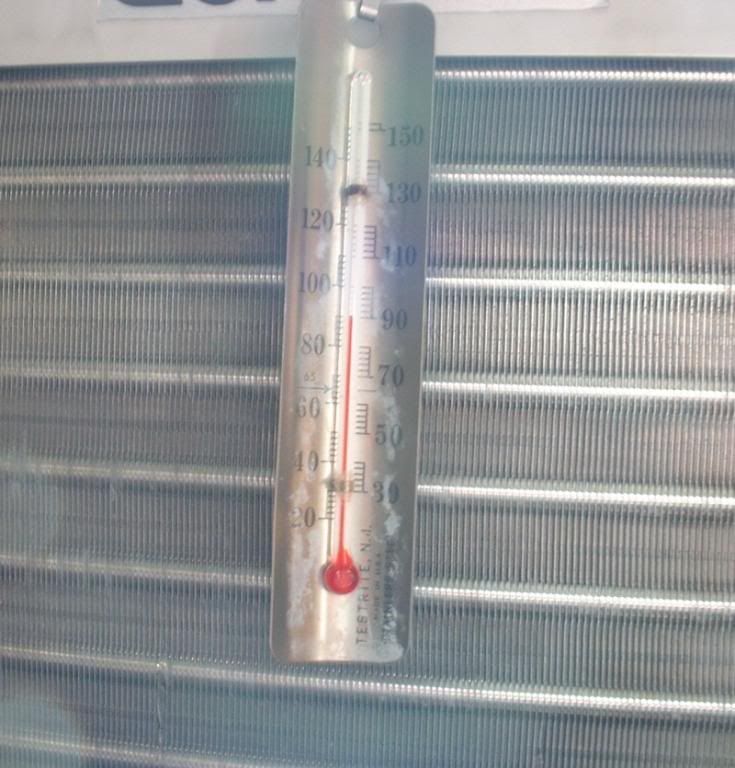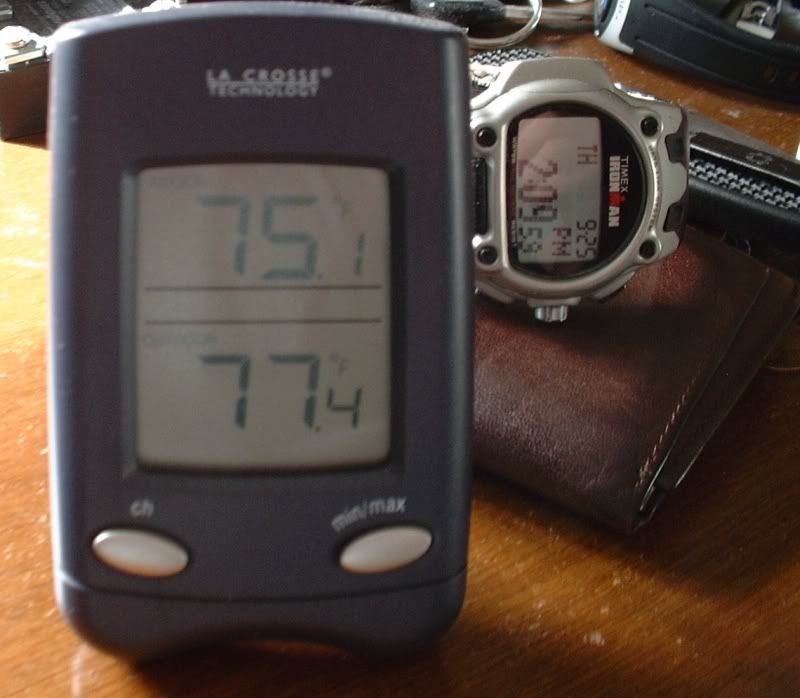 09-20-2008, 01:47 PM
09-20-2008, 01:47 PM
|
#1 (permalink)
|
|
Old Retired R&D Dude
Join Date: May 2008
Location: Woburn Mass USA
Posts: 702
Thanks: 10
Thanked 18 Times in 17 Posts
|
DIY heat pump??
I've got this little window AC that we use in the bed room.
It cools the room nicely with it's 5,250 BTU/h using only 540 watts.
This morning, it was kinda cool here in New England. It in the 50s
outdoors and in the low 60s inside the house.
To take the chill out, I plugged in a 1500 watt space heater.
Humm, 1500 watts.. Is 1500 watt-hours really equal to 5118.2 BTU/h ??
That must be right, since the little 1500W heater does heat up the room ok..
So, what seems strange is my little window AC unit is putting out 5,250 BTU/h
and it's only using 540 watts! (960W less than the space heater).
How does the AC do that?? I think it might have to do with the fact it's
pumping outside air into a hot coil and exhausting really hot air..
It's a heat pump. Pumping hot air OUT of my house, by simply heating
up the great outdoors ( adding to global warming).
 HowStuffWorks "Air-conditioning Basics"
So, what if I turned it around backwards in the window, blowing cold air outside..?.
HowStuffWorks "Air-conditioning Basics"
So, what if I turned it around backwards in the window, blowing cold air outside..?. And Hot air inside!
Would I get 5,250 BTU/s of heating for a mere 540W (instead of 1500W)??
This is the kind of stuff that keeps me awake at night.. 
__________________
Cheers,
Rich
Current ride: 2014 RAV4 LE AWD (24 MPG)
Wife's Pizza Transporter

|
|
|

|
 Today Today
|
|
|
|
 Other popular topics in this forum...
Other popular topics in this forum...
|
|
|
|
 09-20-2008, 02:15 PM
09-20-2008, 02:15 PM
|
#2 (permalink)
|
|
Master EcoModder
Join Date: May 2008
Location: Auburn, NH
Posts: 451
Thanks: 0
Thanked 2 Times in 2 Posts
|
The problem is heat pumps are very inefficient in cold environments. The heat expelled from the condenser was originally absorbed from the air passing over the evaporator. In a cold environment there is very little heat to be absorbed by the evaporator, therefore little heat is produced.
Your window A/C unit was designed to do one thing: cool. There are larger wall mount units that do both heating and cooling, but the efficiency numbers for the heating cycle are much lower than the cooling cycle.
__________________

|
|
|

|
 09-20-2008, 04:49 PM
09-20-2008, 04:49 PM
|
#3 (permalink)
|
|
Old Retired R&D Dude
Join Date: May 2008
Location: Woburn Mass USA
Posts: 702
Thanks: 10
Thanked 18 Times in 17 Posts
|
GT
Quote:
Originally Posted by SuperTrooper

The problem is heat pumps are very inefficient in cold environments. The heat expelled from the condenser was originally absorbed from the air passing over the evaporator. In a cold environment there is very little heat to be absorbed by the evaporator, therefore little heat is produced.
Your window A/C unit was designed to do one thing: cool. There are larger wall mount units that do both heating and cooling, but the efficiency numbers for the heating cycle are much lower than the cooling cycle.
|
But today, it's in the 50s 
I'm thinking today would be the perfect kind of day for a mild-heat pump system. Scavenge what heat is left of the summer! 
My backyard borders on a little swamp, and 70 yards back is a small lake (~ 100,000 sq feet). It's surface is 2 below the bottom of my back yard. This means the water table in the lower part of the backyard is only about 2 feet down..

So, I have a giant source of 54 to 58 degree water/coolant in the ground out back.
All I have to do is plant a really big heat exchanger about 5 feet underground. Closed-loop type sounds like the best.
This morning, I ran the cold water tap for a long time before making my
breakfast drink. It didn't feel cold, so I measured it. 62 degrees!
It was room temperature! (The hotwater system was off & cold).
Anyways, that should take care of the problem of cold weather..?.
Just have to build the right kind of heat exchanger to couple into a modded AC unit.?.
__________________
Cheers,
Rich
Current ride: 2014 RAV4 LE AWD (24 MPG)
Wife's Pizza Transporter

|
|
|

|
 09-20-2008, 06:35 PM
09-20-2008, 06:35 PM
|
#4 (permalink)
|
|
EcoModding Lurker
Join Date: Sep 2008
Location: Portland Oregon
Posts: 34
Thanks: 0
Thanked 0 Times in 0 Posts
|
Depending on your location but many people actually put their exchangers into ponds and lakes. In fact, I believe these are typically the most effecient heat pump systems. Since, I don't live so close to a body of water I never researched this type of heat pump but if you have rights to that lake and it never completely freezes you could probably save a ton of money with a heat pump.
I did look into burying my coils when I replaced my 60 year old oil furnace with an electric heat pump this last spring and the cost went from $12,000 (with complete electrical upgrade) to something like $25,000-$30,000 guess from the estimator (he said he wasn't sure cause it's so expensive he's never actually sold one). Most of that cost is in the massive amount of copper pipe needed.
But I'm happy to say that the new heat pump not only saved us in heating fuel costs, but the old heater used so much power for the fan and ignition and ditching the two window AC units that even our electric bill dropped by about $100.00 a month. Not bad, and it's all electric so it's the most adaptable of systems on the market when it comes to future energy. (Sorry gas and oil---you're all dinosaurs).
<edit> BTW...there's a lot of math involved with DIYing such a system. You need to know how many BTU's you need to keep your house X degree's and how much insulation your house has, how much heat loss etc etc.... Not to mention you gotta plan for drainage of water condensation in the coil systems in a buried line system. It's a ton of work and money and destroyed yard if you screw it up and it doesn't work right.
I'm usually all for DIY projects, (especially since I work in construction) and I'm afraid to say a buried exchanger heat pump I'd leave to the professionals. If for no other reason that if it doesn't work right they should offer a guarantee and they have insurance to dig it up and fix it should something go wrong with it or if it or they cause damage to your property.
__________________
"Without deviation from the norm, progress is not possible"---F. Zappa
If we can't be free, at least we can be cheap"--- Again F. Zappa
My guilty little pleasure
Last edited by conradpdx; 09-20-2008 at 06:50 PM..
|
|
|

|
 09-20-2008, 07:27 PM
09-20-2008, 07:27 PM
|
#5 (permalink)
|
|
Old Retired R&D Dude
Join Date: May 2008
Location: Woburn Mass USA
Posts: 702
Thanks: 10
Thanked 18 Times in 17 Posts
|
Quote:
Originally Posted by conradpdx

Depending on your location but many people actually put their exchangers into ponds and lakes. In fact, I believe these are typically the most effecient heat pump systems typically. Since, I don't live so close to a body of water I never researched this type of heat pump but if you have rights to that lake and it never completely freezes you could probably save a ton of money with a heat pump.
I did look into burying my coils when I replaced my 60 year old oil furnace with an electric heat pump this last spring and the cost went from $12,000 (with complete electrical upgrade) to something like $25,000-$30,000 guess from the estimator (he said he wasn't sure cause it's so expensive he's never actually sold one). Most of that cost is in the massive amount of copper pipe needed.
But I'm happy to say that the new heat pump not only saved us in heating fuel costs, but the old heater used so much power for the fan and ignition and ditching the two window AC units that even our electric bill dropped by about $100.00 a month. Not bad, and it's all electric so it's the most adaptable of systems on the market when it comes to future energy. (Sorry gas and oil---you're all dinosaurs).
|
It's good to hear from someone with a heat pump! Glad it working out so well for you. I fear this oil burner I'm using is about to bring me into a world of woe.. Luckily, it can also burn coal, wood or junk mail.. 
I've just spent a lot of this afternoon reading about closed loop systems.
The pond loops seem to be one of the easier installs.
But, all of the hardware is kinda costly. Plus, it takes 'trained experts' to install it all for you, that runs the bill way the heck up..
It's like solar PV stuff. You price out the kit and it's $9,500 but the the total after installation is $22,000 
Here's a sample ECONAR GeoSource Geothermal Heat Pumps: DualTEK of what I've been reading about. The manuals at some of these sites are very informative.
The Average year-round air temp here is 48f. And I read that's also supposed to be the average ground water temp. It's just a bit higher at the end of summer.
But, I don't think it will get down to 45 by the end of winter.
If they are using ground loops for heat up in Canada, I'm sure it will work down here..
I'm starting to think if a guy just wanted to do a closed-loop system on a small scale, like 10,000 to 20,000 BTU/h, he would likely have to DIY..
If the day comes when we can't get some heating oil delivered, it might be
nice to use some KWHs without getting a massive electric bill hit.
I have a spot in the low lands of my backyard where I could dig a 90'L x 8'W trench. I'm not sure how deep I could get before it got too muddy to work.
If I could get it down to 4 feet+, I think it would work okay.
Mud might be a good sign. If the pipes are deep in mud that's below a foot below the frost line..?.
I've looked at a couple of old ACs and I think it might not be real hard to tweak an old 18,000 BTU Kenmore into use as a heat pump.
I see them for sale around here all the time. Even a new one isn't that costly if you by it in the fall.
During the hot humid summertime, that closed loop could be connected to a easy DIY dehumidifier/cooler for my basement shop!
__________________
Cheers,
Rich
Current ride: 2014 RAV4 LE AWD (24 MPG)
Wife's Pizza Transporter

|
|
|

|
 09-20-2008, 10:01 PM
09-20-2008, 10:01 PM
|
#6 (permalink)
|
|
EcoModding Lurker
Join Date: Sep 2008
Location: Portland Oregon
Posts: 34
Thanks: 0
Thanked 0 Times in 0 Posts
|
Well, I know a few things you should consider. Soil type will influence the depth of the trench. I wouldn't necessarily hope for mud deep down. Depending on your local climate that could mean that things will freeze deeper than your "frost line". Also wet soil round the exchange coils could mean you might have condensation and humidity problems which could turn into greater problems with mold etc. inside the house.
Most systems either drain into an underground leech field or back into the house to be pumped away. If your house is supported on a basement foundation this wouldn't be a problem, you could easily slightly slope the exchangers so they drain into the house then pump/drain it there. If your houses foundation is above surface grade too moist of surrounding soil would make it so you'd need to dehumidify the air as it enters the house. If you use a leech field and the soil is constantly damp (even before the exchangers are installed) you'd get greater condensation on the tube walls which will amount to too much humidity entering the house, perhaps even in the exchangers themselves. Which (I doubt it'd happen at 5 ft. too much thermal mass over top) could perhaps cause freezing within the pipes which would be a disaster.
Even if you still plan on doing it yourself I'd at least spend a few hundered bucks and consult someone that designs these type of systems professionally, at least to determine the size and depth of your field. After all $500-1000 dollars to know you get right would be paid off really fast if you DIY'd this project. Especially if it saves you from having to add on to the exchange coils or fix slope/grade of system later.
Now let me also say I'm by no means an expert. I spent about a month exploring my possibilities before we went with the air to air exchanger. Luckily the climate here in Portland Oregon seldom gets below freezing so such a system is possible. I'm not saying that you can't do it, but I'd hate to see someone get in over their head or not think of all the possible outcomes I know for awhile there I was considering renting the backhoe and doing it myself as well, but it was one of those things that the more I thought about it the more I realized it'd be easy to get in over ones head on this project. And I do some fairly extreme DIY projects ( half wall structural cutouts, below grade egresses access points etc.).
It very well can be easier than I think too. After all before we went the heat pump route I wasted about $4,000 on electric radiant floor heating mats that I was convinced would do more space heating than they did.
__________________
"Without deviation from the norm, progress is not possible"---F. Zappa
If we can't be free, at least we can be cheap"--- Again F. Zappa
My guilty little pleasure
|
|
|

|
 09-20-2008, 10:31 PM
09-20-2008, 10:31 PM
|
#7 (permalink)
|
|
Old Retired R&D Dude
Join Date: May 2008
Location: Woburn Mass USA
Posts: 702
Thanks: 10
Thanked 18 Times in 17 Posts
|
Winter is almost here
If this turns out to be something worth doing, I'll drill some test holes and see exactly where the water table is located and the condition of the soil above it.
I might install a remote temperature sensor down in the water table.
If it gets stays around 48deg all winter, then I can think about buying
the loop pipe.. It's a plastic that conducts heat real well.
I think you are (above) talking about an open loop system.
That type of system requires that some professional wells be drilled.
I'm more interested in a closed loop system. Here's one used in a pond.

Some pics on this page, half way down: Geothermal heat pumps at home
The pipe is filled with glycol and water. It's a sealed system.
The water is pumped out of the house to the loop, where it's
warmed up to 48f and comes back in to the heat pump exchanger
where the heat is sucked out and pumped into the house.
Some of the newer systems actually use copper loops and run
the refrigerant (freon like stuff) underground and skip using the water-glycol mix.
They say it's a lot more efficient..
__________________
Cheers,
Rich
Current ride: 2014 RAV4 LE AWD (24 MPG)
Wife's Pizza Transporter

|
|
|

|
 09-22-2008, 02:09 PM
09-22-2008, 02:09 PM
|
#8 (permalink)
|
|
Old Retired R&D Dude
Join Date: May 2008
Location: Woburn Mass USA
Posts: 702
Thanks: 10
Thanked 18 Times in 17 Posts
|
25,000 BTU space heater.
I found my Geothermal heat source!

It's been right under my nose since 1973 (well, about 12 feet under my nose). The basement floor!
We have a zone of forced hotwater heat down there, but right after
you turn off the heat, that full basement slab and 8" walls swing
the air temp right back towards ground water temp..
Since this heat is coming from solar warming the earth's outer crust , my guess is by the end of winter, we might see down to around 57 or so.
My point?
I don't need no stinking pipes buried in the back yard. I've got my basement full of 64 degree air(72 today)..
If cold air is injected into the basement, the slab warms it back up pretty quick.
Now, I'm looking at the possibility of installing a large window type AC unit
down in the basement and venting the "waste" air upstairs for space heating.
This is the AC I've been thinking of.. http//210.118.57.197/Products/AirConditioner/ElectronicControl/AW25ECB7XAA.asp
It would cool the basement, (while heating upstairs), hitting us with 25,000 BTU/h (Unless we used low speed). 
Power source: 208-230 V
Power input: 2,600/2,660 watts
Power amperage: 12.8/12.0
It takes about 7,268 Watts/h to generate 25,000 BTU/h if you use resistive heating elements (common electric space heaters) .
Since the Samsung will be a little loud, I would use it during the day and go to oil heat at night. Adding a thermostat to control it will be simple. (attaching a small warming resistor to the AC's air temp sensor).
The basement will get cold, but will come back to normal overnight.
Since the boiler will be hot 24/7 any waste heat from it will be scavenged
but the Samsung AC (aka Heatpump).
__________________
Cheers,
Rich
Current ride: 2014 RAV4 LE AWD (24 MPG)
Wife's Pizza Transporter

|
|
|

|
 09-25-2008, 09:39 AM
09-25-2008, 09:39 AM
|
#9 (permalink)
|
|
Old Retired R&D Dude
Join Date: May 2008
Location: Woburn Mass USA
Posts: 702
Thanks: 10
Thanked 18 Times in 17 Posts
|
Check out this small Heat Pump (for Hotwater)
 Airgenerate.com | Adaptive Energy Solutions
Airgenerate.com | Adaptive Energy Solutions
And, it works pretty well at cool temps too.

If this works in a small room (per AirTap specs), I'll bet my AC/HeatPump will
do around 200% COP in my basement.. 
__________________
Cheers,
Rich
Current ride: 2014 RAV4 LE AWD (24 MPG)
Wife's Pizza Transporter

|
|
|

|
 09-25-2008, 03:49 PM
09-25-2008, 03:49 PM
|
#10 (permalink)
|
|
Old Retired R&D Dude
Join Date: May 2008
Location: Woburn Mass USA
Posts: 702
Thanks: 10
Thanked 18 Times in 17 Posts
|
Experiment..
Turned the little AC around.

Now it's in Heat Pump mode.

The inside and outside temps.

More inside temp(hall thermostat) .

After 10 to 15 minutes, the hot air was at 90 degrees. (pulling 22 additional degrees out of the 68 degree outdoor air). 

The room went up to 75 pretty quick. (That 77 is the attic temp).

The Heat Pump output was a fairly large volume of 90 degree air. It didn't feel as hot on my hand as my resistive space heater.
I guess the difference is the extra width of the air flow from the back end of the AC. I was surprised how quickly the whole room got hot.
This little AC started up slowly, but soon it appeared to be warming the room pretty well.
My guess is, it was doing about the same job as my 1500W space heater, but was doing it on 540W.
I think this test was a good indicator that an AC unit can be used for heating if you have some mild air available.
This tends to make me think my 25,000 BTU space heater idea just might work. It may not be 3 times as efficient as electric baseboard heat, but I'm pretty sure it will be at least twice as efficient.
__________________
Cheers,
Rich
Current ride: 2014 RAV4 LE AWD (24 MPG)
Wife's Pizza Transporter

|
|
|

|
|